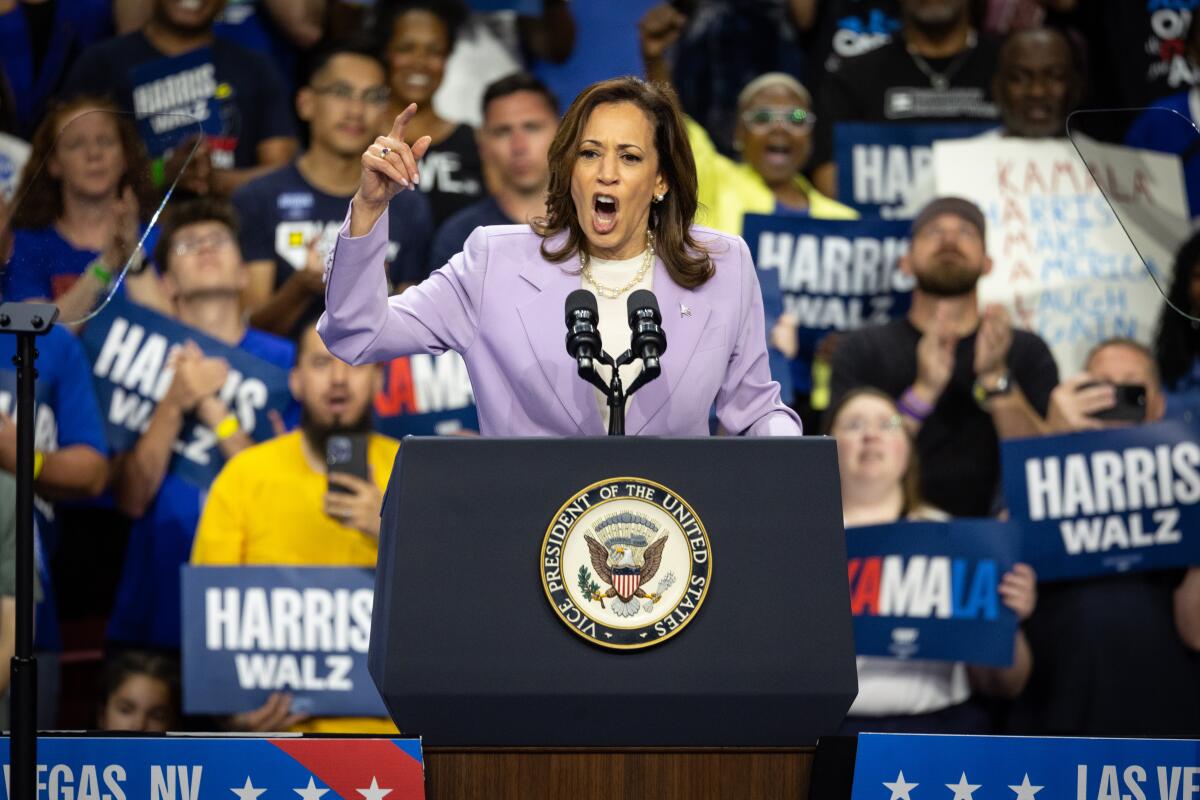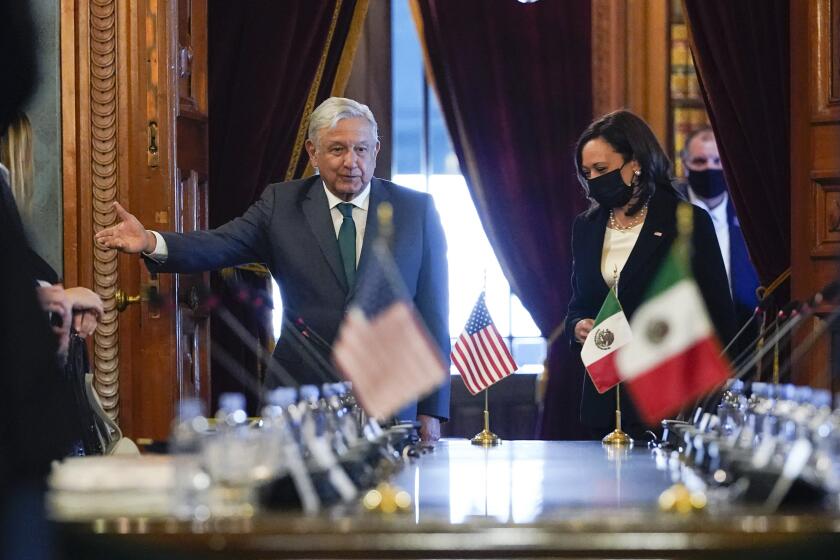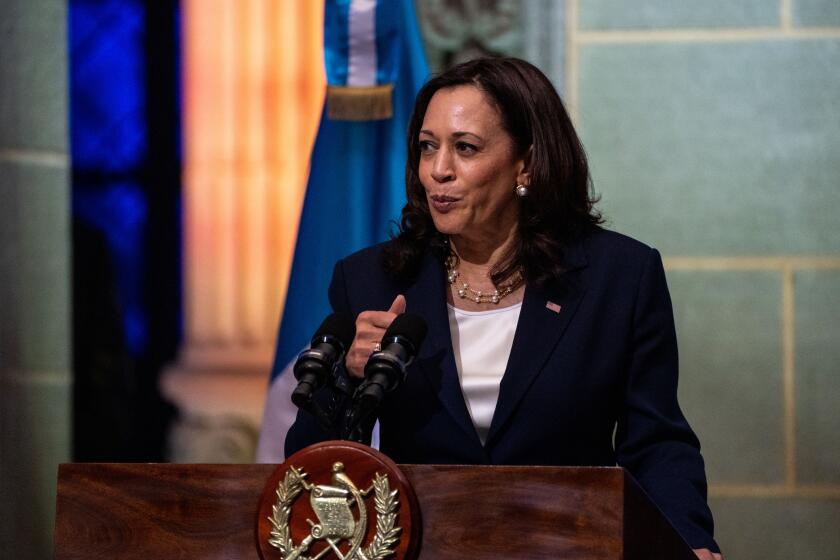Harris offers ‘freedom’ and contrast to Trump, but not many policy details

WASHINGTON — Vice President Kamala Harris has developed a crowd-pleasing line for when she campaigns against Project 2025, the 887-page policy agenda written for former President Trump by his Republican allies.
“I can’t believe they put that thing in writing,” she says at rallies, drawing laughs and applause.
Her words are meant to emphasize what she and other Democrats portray as a radical Trump agenda. But it also reveals what has so far been Harris’ tendency to campaign in broad themes on “freedom” and her contrast with Trump without exposing her own vision to the scrutiny that faces detailed policy plans.
Harris is less than a month into her turn at the top of the ticket in her race against Trump. She told reporters on Saturday that she would roll out more economic policies this week. But the combination of an abbreviated campaign and a desire to maintain positive political momentum has resulted in less detailed plans than most prior nominees share.
Trump’s proposals are often criticized as vague, extreme or incoherent. And he has tried to distance himself from Project 2025.
Harris has yet to create an issues section on her campaign website. She is running largely on her achievements alongside President Biden over the last 3½ years, and on broad pledges to work for the middle class, expand reproductive rights and forge a more balanced approach than Trump on immigration and other divisive problems where she is more politically vulnerable.
Kamala Harris struggled to find her political footing in her early years as vice president. Her allies say that has changed since Roe vs. Wade was overturned.
“Ours is a fight for the future, and it is a fight for freedom,” she said at a rally in Arizona on Friday.
But the pressure is growing for her to say more, especially in areas where she may differ from Biden or has shifted her stance since the 2020 Democratic primary, when she courted her party’s progressive wing.
“There’s a lot of political observers now who are all living off the sugar high of these last three weeks,” said Kevin Madden, who was spokesman for Republican Sen. Mitt Romney’s 2012 presidential run. “That’s quickly coming to a close.”
In addition to deciding who runs the country, campaigns help vet ideas and mark national priorities, allowing candidates to set the terms of the debate for the ensuing four years.
Biden and Harris deployed the 2020 “Build Back Better” slogan as the basis for signature laws that spent trillions of dollars on infrastructure, environmental and antipoverty programs — using their victory as a mandate to help win congressional approval.
Lanhee Chen, Romney’s lead policy advisor in 2012, described a detailed process from the Republican’s campaign that involved hours of debate: Aides would develop competing proposals and challenge one another in front of Romney — a strategy meant to prepare the candidate and his inner circle to set policy in the White House.
But detailed plans also pose political risk. And in the Trump era, Democrats have been complaining more aggressively that such traditions have become one-sided, blaming the news media for complicity.
“There’s an expectation that Democrats have to have a million plans — and Republicans don’t have plans, and all they do is focus on the Dems’ plans,” said one person who is in contact with the Harris campaign, speaking anonymously to be candid.
They and others in Harris’ orbit promised that next week’s Democratic National Convention in Chicago would showcase more specifics, including the party’s platform, which is now in draft form.
On Mideast violence
But current events are also likely to compel Harris to respond — particularly the war between Israel and Hamas, which appears close to escalating into a broader regional conflict.
“The rush of events we are seeing — some of which are predictable, some of which are unpredictable — are going to force a reckoning,” said Natasha Hall, a senior fellow with the Middle East Program at the Center for Strategic and International Studies.
Harris has been more forceful than Biden in calling on Israel to strike a cease-fire deal with Hamas that would return Israeli hostages. But she has not drawn sharp policy differences, resisting calls, for example, from progressive activists to withhold U.S. arms from Israel.
Still, the shift in tone has bought her goodwill from progressives and pro-Palestinian activists — who were furious with Biden — but she may not be able to straddle the line until the election, Hall said.
Harris is likely to model most of her foreign policy on Biden’s. In response to questions from The Times, her campaign reiterated support for a two-state solution to the Israel-Palestinian conflict. But “what everyone is looking to is how her policy will differ in the Middle East,” Hall said.
On health and crime
Debates are playing out in a similar manner on other policy fronts. Harris has backed away from her partial embrace of a single-payer healthcare plan she promoted in the 2020 campaign, and is now campaigning to protect the Affordable Care Act, widely known as Obamacare, which Trump repeatedly sought to repeal when he was president.
Her campaign told The Times she wants to expand access to affordable care and lower patient costs for drugs and premiums, but did not provide a plan.
On law and order
Harris has also emphasized her prosecutorial record, in contrast to her 2020 statement questioning police budget priorities, but has not laid out a criminal justice platform.
“They can make the race about Trump. The problem is that Trump will make it about Harris,” said Chen, who ran unsuccessfully for California controller in 2022. “There’s enough in her record that is to the left of where I think most Americans are.”
Progressives who were critical of Biden are giving Harris leeway, for now.
Less than a week into a reframed general election, it is clear that the race between Harris and Trump is not just between a man and a woman, but about competing notions of gender roles.
“A lot of our generation feel cautiously optimistic,” said Stevie O’Hanlon, communications director for the Sunrise Movement, a youth-focused climate group. “It was a big shift that President Biden dropped out. I think a lot of young people are feeling energized by politics actually working for once.”
O’Hanlon said Sunrise would campaign for Harris, but would like to see “some meat on the bones” of her climate plans.
On income disparity
The Rev. William Barber, an anti-poverty activist, said that “if you listen very closely,” Harris “is talking about the things that everyday, particularly poor and low-wage folk, need to hear.” He cited her promise to put unions, a living wage and other issues she campaigned with Biden on in 2020 at the center of her 2024 campaign.
Dan Geldon, a top advisor on Massachusetts Sen. Elizabeth Warren’s 2020 campaign, which made a slogan out of her love of writing policy plans, said the context for Harris is different because she is running as an incumbent vice president.
“She has been giving speeches making clear that on Day 1 she is going to push back on price gouging, on junk fees and on banks, pharma companies and landlords who deserve accountability,” he said approvingly, alluding to promises that include caps on rent increases and prescription costs.
But without a full blueprint, it’s harder to gauge whether her promises would win approval in Congress, how they would be paid for, or how they’d affect the economy — and harder to hold her accountable for fulfilling them if elected.
At a rally in Nevada on Saturday, for example, Harris announced she favored removing taxes from tipped wages, similar to a Trump proposal that has drawn criticism from many economists as an arbitrary gift to one class of workers that fails to take into account other measures of fairness.
Without details, there is no way to accurately judge how much her proposal would cost the government in lost revenue or how workers in differing states and income levels would be affected.
Immigration experts say the Biden administration picked the wrong immigration strategy, choosing a plan that failed to anticipate the shifting nature of migration.
On the border
Harris also laid out part of an immigration agenda during a rally in Arizona on Friday, emphasizing her role in prosecuting human traffickers and smugglers as California’s attorney general from 2011 to 2017. The tougher rhetoric coincides with an overall harder line since her 2020 campaign, when she joined others in criticizing Immigration and Customs Enforcement.
“We know our immigration system is broken and we know what it takes to fix it,” she said in Arizona. “Comprehensive reform that includes strong border security and an earned pathway to citizenship.”
She criticized Trump for sabotaging a border enforcement bill negotiated with Republicans, and pledged to sign it if elected.
Trump has lambasted Harris, falsely calling her the “border czar” because she led the administration’s efforts to improve economic and security conditions in Central America to curb migration from the region. Harris’ tough talk signals that she recognizes the political vulnerability.
It also shows that Harris “as a president would be prepared to put her own leadership stamp on” immigration reform, said Doris Meissner, director of the U.S. Immigration Policy Program at the Migration Policy Institute, a nonpartisan, left-leaning think tank. “I would argue that that’s different than Biden treated it.”
More to Read
Get the L.A. Times Politics newsletter
Deeply reported insights into legislation, politics and policy from Sacramento, Washington and beyond. In your inbox three times per week.
You may occasionally receive promotional content from the Los Angeles Times.














